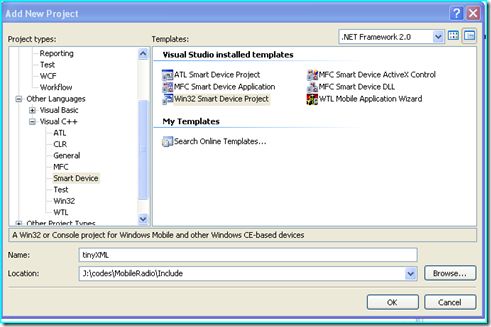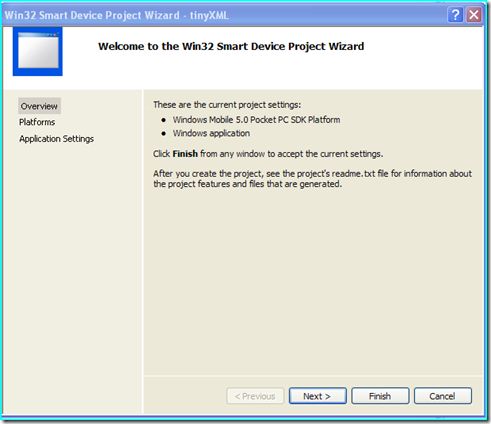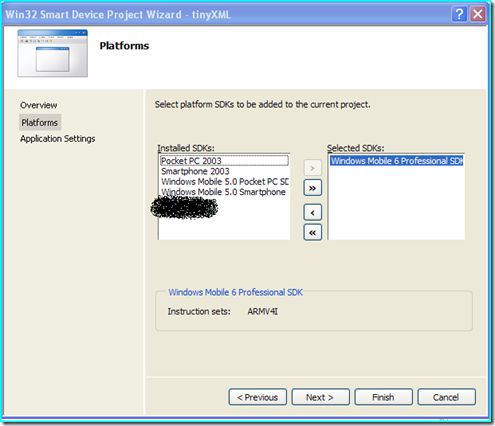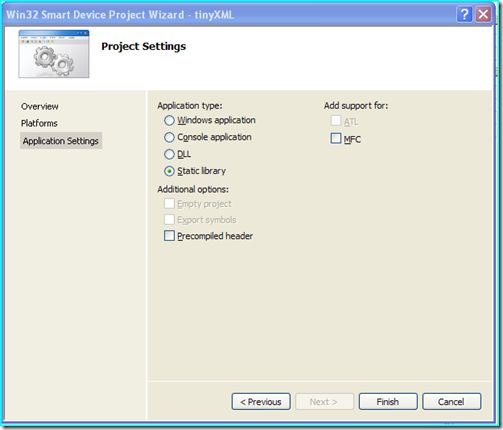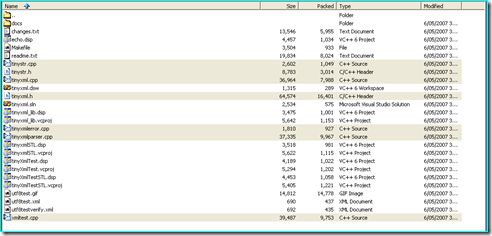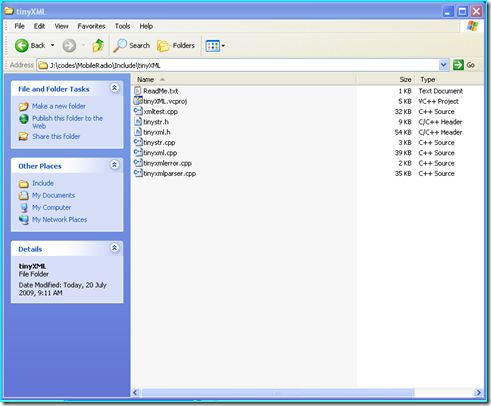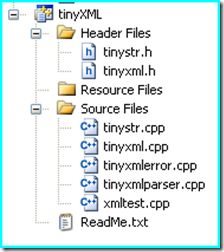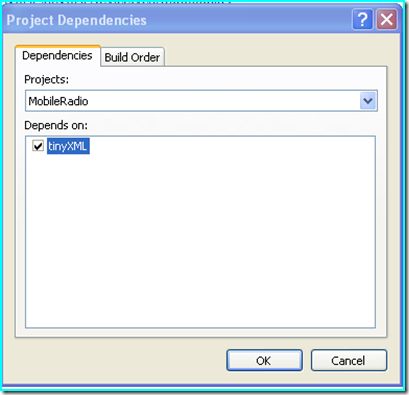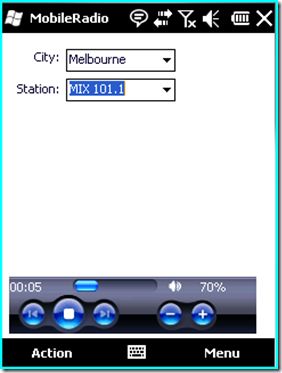Windows Mobile和Wince下使用TinyXML进行Native C++的开发
背景
继续讲述Mobile Radio项目的开发,上回讲到如何把自于 www.1radio.com.au 网站的电台数据从JSON转换成XML。这回讲述使用tinyXML在windows mobile下进行XML的开发。
Mobile Radio项目可以参考:
Windows Mobile和Wince下的WTL(Windows Template Library)开发
Windows Mobile 和 Wince 下的 WTL(Windows Template Library) 界面开发
Windows Mobile和Wince下使用WTL进行Windows Media Player开发
简介
XML已经成为流行的数据保存和交换的格式,本文讲述如何使用TinyXML在Windows Mobile下进行XML的开发。TinyXML是简单,轻装,跨平台的原生C++ xml解释器,可以十分简便的整合到其他系统中。同时TinyXML提供完整的在线文档,方便开发和使用。目前,由于其简便性和稳定性,使用ZLib license(可以用于开源和商业)等原因,TinyXML已经广泛被用于开源社区和商业系统中。
关于更多TinyXML的介绍请看下面链接:
http://sourceforge.net/projects/tinyxml/
http://www.grinninglizard.com/tinyxml/index.html
http://www.grinninglizard.com/tinyxmldocs/index.html
环境搭建
下载
请到http://sourceforge.net/projects/tinyxml/ 下载最新的release。
新建项目
新建Smart Device项目tinyXML。
点击Next
选择平台,这里选择Windows Mobile 6 Professional SDK。
选择生成静态库,不需要MFC支持和不需要生成预编译文件,点击完成。
把下载的TinyXML源代码文件(包括CPP和H文件)拷贝到项目目录下。
把源代码文件(包括CPP和H文件)添加到项目中。
设置依赖性
在Project –> Project Dependencies设置项目依赖性,Mobile Radio依赖于TinyXML。
如果使用在Windows Mobile环境下,需要更改下面的代码。
// Microsoft compiler security
FILE* TiXmlFOpen( const char* filename, const char* mode )
{
//#if defined(_MSC_VER) && (_MSC_VER >= 1400 )
// FILE* fp = 0;
// errno_t err = fopen_s( &fp, filename, mode );
// if ( !err && fp )
// return fp;
// return 0;
//#else
// return fopen( filename, mode );
//#endif
return fopen( filename, mode );
}
tinyxml.cpp文件
//#define TIXML_SAFE
#define TIXML_SSCANF sscanf
tinyxml.h文件
环境搭建完毕。
使用
使用TinyXML是一个愉悦的过程,所有使用的例子都可以在源代码的xmltest.cpp文件里面找到。所以强烈建议学习和使用TinyXML前先认真阅读xmltest.cpp的代码。
简单讲一下XML文件的结构,XML的结构就是层次性(Hierarchy)文件,包含Element(节点)和Attribute(属性),下面我保留英文,因为TinyXML的接口就也是使用同样的术语。Element就是节点,可以包含Attribute和子Element(Child Elements),Attribute就是Element的属性。
下面是Mobile Radio使用TinyXML的代码。
#include "include/tinyXML/tinyXML.h"
使用TinyXML只需要引用一个头文件就可以了。
const char* CONFIGPATH = "Config\\Stations.xml";
void CMobileRadioView::LoadConfig()
{
std::string p = GetCurrentPath() + std::string(CONFIGPATH);
TiXmlDocument document = TiXmlDocument(p.c_str());
if(!document.LoadFile())
{
MessageBox(L"Can not open the config file.");
return;
}
TiXmlHandle docHandle(&document);
TiXmlElement* cityElement = docHandle.FirstChild("stations").FirstChild("city").Element();
Station* station;
std::string city;
while (cityElement)
{
city = cityElement->Attribute("name");
TiXmlElement* stationElement = cityElement->FirstChildElement("station");
while (stationElement)
{
station = new Station();
station->City = city;
station->Id = atoi(stationElement->Attribute("sid"));
station->Name = stationElement->Attribute("name");
station->Image = stationElement->Attribute("image");
station->Stream = stationElement->Attribute("stream");
station->Website = stationElement->Attribute("website");
stationMap[station->Id] = station;
cityStationMap.insert(CityStationMap::value_type(station->City, station));
stationElement = stationElement->NextSiblingElement();
}
cityElement = cityElement->NextSiblingElement();
}
}
这是读取XML配置的代码,XML配置文件的结构可以参考 转换Json到XML的JavaScript实现 。大体的文件结构是分两层,第一层是城市,第二层是具体的电台信息。
TiXmlDocument document = TiXmlDocument(p.c_str());
if(!document.LoadFile())
{
MessageBox(L"Can not open the config file.");
return;
}
TiXmlHandle docHandle(&document);
TiXmlElement* cityElement = docHandle.FirstChild("stations").FirstChild("city").Element();
TinyXML不直接支持XPath,所以只能一层层读,从根节点逐层查找。如果需要XPath支持,可以参考TinyXPath (http://tinyxpath.sourceforge.net)。
while (cityElement)
{
city = cityElement->Attribute("name");
TiXmlElement* stationElement = cityElement->FirstChildElement("station");
while (stationElement)
{
station = new Station();
station->City = city;
station->Id = atoi(stationElement->Attribute("sid"));
station->Name = stationElement->Attribute("name");
station->Image = stationElement->Attribute("image");
station->Stream = stationElement->Attribute("stream");
station->Website = stationElement->Attribute("website");
stationMap[station->Id] = station;
cityStationMap.insert(CityStationMap::value_type(station->City, station));
stationElement = stationElement->NextSiblingElement();
}
cityElement = cityElement->NextSiblingElement();
}
循环取出城市(City)和电台(Station)信息,FirstChildElement()查找第一个子Element。NextSiblingElement()用于读取同一层的兄弟Element,Attribute可以取出Element的Attribute。关于更多的读取例子,请看xmltest.cpp的代码。
上述例子把XML配置信息读取到C++的map和multimap里面。这两个容器的定义如下:
//Id -> Station
typedef std::map<int, Station*> StationMap;
//City -> Station
typedef std::multimap<std::string, Station*> CityStationMap;
StationMap保存ID和电台信息,一对一。CityStationMap保存城市和电台信息,一对多。
界面处理
两个容器初始化完毕以后,界面可以根据容器的信息生成。
for(CityStationMap::iterator it=cityStationMap.begin();
it!=cityStationMap.end(); ++it)
{
if(city.compare(it->first) != 0)
{
city = it->first;
CString c = city.c_str();
m_wndCity.AddString(c);
}
}
根据配置信息显示城市下拉框,由于multimap不支持直接把所有的key的集合读取出来,所以需要遍历,把不同的城市信息显示到m_wndCity下拉框中。
LRESULT CMobileRadioView::OnComboCityCbnSelChange(WORD wNotifyCode, WORD wID, HWND hWndCtl)
{
CString str;
int sel = m_wndCity.GetCurSel();
m_wndCity.GetLBText(sel, str);
m_wndStation.ResetContent();
std::string city = CT2CA(str);
unsigned int i = 0;
for(CityStationMap::iterator it=cityStationMap.find(city);
it!=cityStationMap.end() && i<cityStationMap.count(city); ++it,++i)
{
CString s = it->second->Name.c_str();
int index = m_wndStation.AddString(s);
m_wndStation.SetItemData(index, it->second->Id);
}
return 0;
}
当城市下拉框的选择发生改变时,根据multimap的信息显示该城市下的电台信息。
LRESULT CMobileRadioView::OnComboStationCbnSelChange(WORD wNotifyCode, WORD wID, HWND hWndCtl)
{
int sel = m_wndStation.GetCurSel();
int id = (int)m_wndStation.GetItemData(sel);
//CString image = (GetCurrentPath() + "Image\\" + stationMap[id]->Image).c_str();
//m_wndPic.SetBitmap(LoadBitmap(NULL, image));
m_spWMPPlayer->put_URL(CComBSTR(stationMap[id]->Stream.c_str()));
return 0;
}
当电台下拉框的选择发生改变时,根据map的信息使用Windows Media Player控件播放该电台。
下一次讲述程序如何支持accelerometer(重力感应器)。
关于Mobile Radio - Internet Radio Software for Windows Mobile项目
目前(2009年9月份)这个项目基本功能已经完成,只是界面方面需要改进,提高用户体验。我把项目host到 Mobile Radio - Internet Radio Software for Windows Mobile了,我会持续改进,主要是提高用户体验方面。
需要了解项目最新动态,可以访问 Mobile Radio - Internet Radio Software for Windows Mobile 和我的Blog 精简开发 无线生活。
源代码: 查看Mobile Radio最新源代码
环境:VS2008 + WM 6 professional SDK + WTL 8.1 + TinyXML